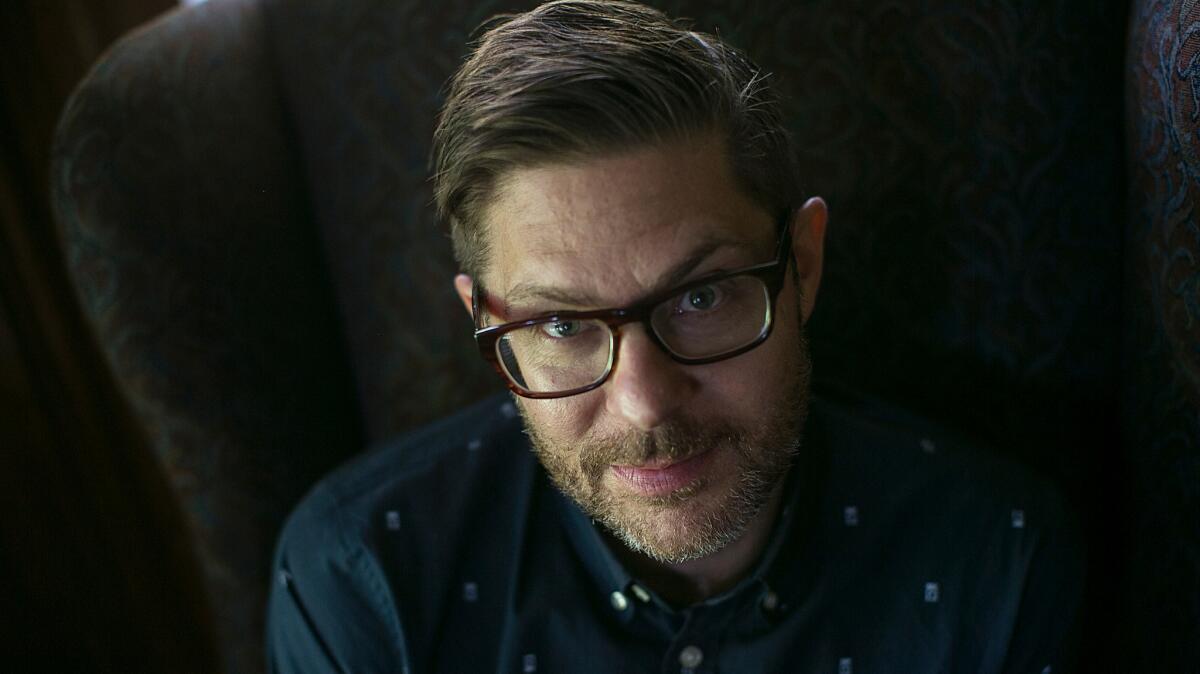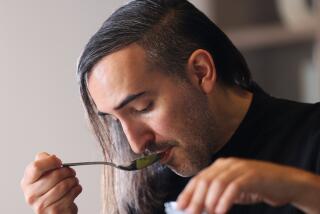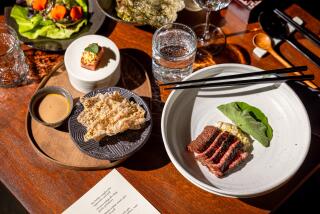Josh Kun, author who uncovered L.A.’s musical counter-history, named MacArthur fellow

Josh Kun was in his USC campus office earlier this week flipping through a stack of records next to a turntable near his desk.
The albums — “Bongo Fever: Jack Costanzo at the Garden of Allah,” “The Exciting Tito Puente in Hollywood,” an easy-listening collection by instrumentalist George Shearing backed by an all-Latin band, curiosities by Mexican composer Esquivel — are part of the communication professor’s research for a Getty project focused on the role that Latin American musicians played in shaping the sound of the city.
It’s “me trying to create this genealogy, this counter-history of L.A. music in the 20th century,” Kun said. “The Sunset Strip is thought of as this place of white rock ’n’ roll and white counterculture. It was also this playground for Latin music.”
Unearthing lesser-known slices of Los Angeles history is just one reason Kun’s work has caught the attention of the Getty, the city’s Library Foundation and now the MacArthur Foundation. After a lifetime of scholarship and publishing, including “To Live and Dine in L.A.,” a book that surveyed the Los Angeles Public Library’s trove of old restaurant menus, and “Songs in the Key of Los Angeles,” which did the same for the institution’s collection of sheet music, Kun became one of 23 MacArthur fellows announced Thursday, just after midnight on the East Coast.
He joins nine other California honorees: human rights lawyer Ahilan Arulanantham, who works with the ACLU of Southern California; author and director of CalArts’ MFA writing program Maggie Nelson; Stanford physical biologist Manu Prakash, whose “frugal science” devices include an origami paper microscope; José A. Quiñonez, whose Mission Asset Fund provides credit to underrepresented immigrant communities; Gene Luen Yang, whose graphic novels often explore the Chinese American experience in California; microbiologist Dianne Newman, who studies bacteria and evolution, and her CalTech colleague Victoria Orphan, whose work focuses on microbial communities and their effect on the environment; sculptor Vincent Fecteau and Jin-Quan Yu, synthetic chemist from Scripps Research Institute.
Kun was informed of his award via a surprise phone call while he was headed to a morning class, but was forced to keep mum for nearly two weeks.
Unsurprisingly, the 45-year-old Kun, who is tall, skinny and usually has a few days’ stubble on his face, has been thinking hard on his role as a scholar, writer and curator.
Over coffee at his Highland Park home, which he and his wife, the singer Ceci Bastida, recently moved into with their 5-year-old daughter, Kun said he’s come up with a music-based metaphor to describe his mission: the cross-fader on a DJ mixer.
By gliding a knob left or right, a great DJ can move from one song to another in a way that seamlessly connects two distinctive works to create a third.
DJs, said Kun, have a specific skill when toggling between tracks: learning how to listen. “You can’t just fade one song into the other. You’ve actually got to know the moment. It can be a micro moment, and it’s usually one that no one expects. In cross-fading, it’s not mixing and erasing things but mixing and keeping things alive and sustaining sounds at the same time.”
His challenge? “How do I try to be and act like a cross-fader? And as a USC professor, how do I make connections between my work on campus with the city writ large — other institutions, museums, libraries, community organizations and nonprofits — and toggle?”

For 2015’s “To Live and Dine in L.A.: Menus and the Making of the Modern City,” it meant Kun and a team of students digging through the Library Foundation’s collection of menus from the city’s earliest restaurants and then collaborating with designers on an exhibition at the Central Library. The goal: to better understand the eating habits and menu preferences, as well as hunger issues, among the immigrant populations settling in the area.
Kun and company capped the project with an event he dubbed a “live mixtape,” which featured a cross-disciplinary onstage team that included L.A. Opera soprano Lisa Eden singing a menu, chef and radio host Evan Kleiman recording a live segment for her show, and famed Kogi food-truck innovator and chef Roy Choi delivering what was billed as “a never-before-seen Los Angeles recipe freestyle” battle with rapper MC Supernatural.
In 2013, Kun’s scholarship and writings on the library’s sheet music archive resulted in “Songs in the Key of Los Angeles,” which gathered hundreds of otherwise forgotten ditties about the early Southern California experience, many of which celebrated the region as an orange-groved Utopia.
That project, which was undertaken with the help of students and library staff, climaxed with a concert, part of California Plaza’s summer Grand Performances series, with Stevie Wonder, Ozomatli, Jackson Browne and La Santa Cecilia presenting formative L.A. songs.
As part of an ongoing exploration of immigration and culture at the Mexican-American border, Kun, who’s fluent in Spanish, has documented the Rock en Español movement of Mexican bands drawing inspiration from American rock music, the Tijuana art and music scene and the outlaw “narco-corridos” that document the drama of the drug war.
Kun’s also mined his Jewish heritage for music-related projects, including “And You Shall Know Us By the Trail of Our Vinyl,” a book and exhibition he put together with Roger Bennett that, in Kun’s words, “tells a very different story from the one I grew up with about what it means to be an American Jew.”

Kun got his start writing about music as a teen growing up on the Westside near Rancho Park. He’d journey to a storefront record store on Pico and spend hours listening.
Even then, his parents told him to rein in his appetite for collecting. “I was told not to buy cassettes or albums because my parents saw early on that I had a problem,” he said. “They could see in the future that there was a hoarding-collecting problem coming up.”
When he discovered the criticism of then-Village Voice writer Greg Tate, “I thought, ‘Whoa, you can do that? You can use music as a way to not just express a cosmology and make connections … but invent your own aesthetic paradigms for how you do it and deal with it the cauldron of race and inequity in the United States through music?”
After a detour that found Kun hosting a show on MTV-Español, he earned his Ph.D from Berkeley in ethnic studies. His first book, “Audiotopia: Music, Race and America,” published in 2005, featured six meditations race and creativity, each riffing on the notion of music’s ability to create idyllic virtual spaces where “contradictions and conflicts do not cancel each other out but coexist and live through each other.”
As he talks, his wife and daughter return from morning ballet lessons and start getting ready for their next Sunday adventure, this one with dad in tow: A matinee performance of “Ma Rainey’s Black Bottom” at the Mark Taper Forum.
Currently he’s working with the Norman Lear Center at USC, where he heads its Popular Music Project, on “The Migrant Songbook,” a collaboration with the National Day Laborer Organizing Network and the day-laborer band Los Jornaleros del Norte (Laborers of the North). The aim: to support songwriting sessions at labor camps and research on migrant music. When finished, the project will feature a Web portal that gathers old and new songs about the immigrant experience.
“Is he not one of the most fascinating guys?” said Lear, the legendary television producer, about Kun. “The way he puts things together, and the variety — he’s like a cross-cultural guru. I think he truly believes we’re versions of each other, and he brings it together, whether it’s music, food or art. He’s creating connections constantly.”
Ken Brecher, president of the Library Foundation of Los Angeles, recalls a brainstorming session for the menu project with Kun and chef Choi. “We started asking the big questions,” Brecher said. “Where was the food sourced from? Why did it matter when the first French restaurant opened in Los Angeles? Why did that mean we were a city?”
Or, as Kun wrote in the book’s introduction: “How do menus express a sense of collective identity — the urban we, the ethnic us, the familiar, the foreign, in an immigrant networked, multi-diaspora city where home-cooking can refer to thousands of different homelands?”
”He’s doing work that’s not being done anywhere else,” said Brecher. “People have done parts of it, but they’re not doing it the way that he’s doing it. He’s looking at the history of America in contemporary times and helping us understand where we came from.”
By resurrecting buried artifacts and reframing their import for contemporary contemplation, Kun’s research has accomplished a goal that he sets out to do for each of his projects: “To write things that don’t end on the page.”
Twitter: @liledit
ALSO
Josh Kun, new MacArthur fellow: We use food and music to draw boundaries, but also cross them
Will winning the MacArthur fellowship allow Lauren Redniss to give up her Murphy bed studio?
‘Anthracite Fields’ composer Julia Wolfe says MacArthur grant will bring ‘time and space’
What this MacArthur winner, an expert in African American art history, plans to do with her grant
Why a MacArthur Foundation grant for playwright Branden Jacobs-Jenkins, 31, is no surprise at all
More to Read
The biggest entertainment stories
Get our big stories about Hollywood, film, television, music, arts, culture and more right in your inbox as soon as they publish.
You may occasionally receive promotional content from the Los Angeles Times.










